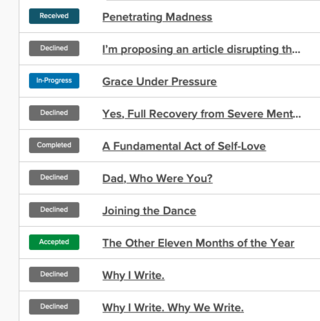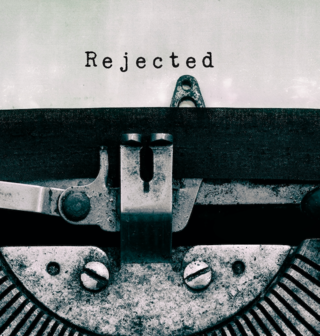Education
The Art of Being Rejected
As I learned to manage rejection, my sensitive temperament tempered over time.
Posted July 19, 2020
I’m taking a Family Connections™ Leaders course this weekend (virtually of course) and Friday was the first day. If you’re not familiar with the Family Connections program you can read more about it here. Developed by the late Dr. Perry Hoffman, the founder of the NEABPD (National Education Alliance for Borderline Personality Disorder), and Dr. Alan Fruzzetti (as per the description on the NEABPD website), “Family Connections™ is a free 12-week course that meets weekly to provide education, skills training, and support for people who are in a relationship with someone who has BPD.”
Something the instructor said stuck with me. He said that although we are born with a certain temperament, it can be changed over time. The context in which this was brought up was invalidating events and environments, which are thought to be contributing factors to developing BPD.
I was born with a very sensitive temperament. Every comment was turned over and dissected in my mind as I searched for a hidden meaning, typically a negative one. Of course, I was adept at finding hidden context in almost every remark and as a result, felt insulted, rejected, and demeaned.
My father, who had a substance use disorder, added fuel to the fire. When he was inebriated, which was often, he used his intelligence to throw barbs at his children. I know he hit my sensitive spots when I started to cry, which was often.
“Stop crying or I’ll really give you something to cry about.”
What was the result?
I cried harder.
“Go to your room.” I fled as I was relieved to leave this confrontation.
My dad never hit my brother or me.
I have memories upon memories stacked precariously on top of one another of times he denigrated me, publicly and privately.
One of the numerous times I was admitted to the psychiatric hospital, I was attending a therapy group and the therapist, who knew me from previous admissions, said to me in front of the entire group, “Andrea, you’re a professional patient,” intimating I’d never be anything else.
The group laughed because they thought he meant it as a joke, but I knew differently. He was serious and what he said hurt. I half-grinned along with the group, but when the group was over and I went back to my room, I cried.
Even though years later I’ve proven him wrong many times over, what he said still stings, because at that moment, he wrote me off. And there were times when I attempted suicide, I wrote myself off as well.
How did I change my temperament?
Writing – and all those rejections.
This is a screenshot of my submittable page.

Submittable is a platform that is used by many literary journals and anthologies. The author enters her name and e-mail address into pre-set fields, and then uploads a copy of the document she wishes to submit. The author can check the status of the non-fiction, fiction, or poetry piece without having to contact the publisher.
You see pieces in various stages, from “declined,” which is a nice word for rejected, to “in progress,” which means currently under review, to “received,” which means I just sent it in and they haven’t looked at it yet. And of course, "accepted," which is what every writer wants to hear. Just to blow my own horn, I had another piece accepted by a published who does not use submittable. It will be published next month and I will provide the link in a future post.
You will note there are many pieces that have been “declined,” and this is only part of the page. The list goes on — this is par for the course for a writer. There are some publications I wanted more than others, and with those, the rejections dug deeper and hurt for a longer period of time.
I could have given up on writing and said this is garbage. I’m not doing this to myself anymore. But, I love to write. And from some of the comments I get, I believe my writing helps other people.

Aside from writing, how do I react when I receive criticism regarding other aspects of my life? Hopefully, it’s constructive criticism and I like to think I’m open-minded. I like to think I accept it and learn from it. The more personal the criticism is, the more it hurts, or the harder I’ve worked on a project and if I believe I’ve done a great job, the more the criticism stings. Sometimes, my work gets torn apart, which really hurts – I may even cry in private.
What has changed is that I don’t ruminate on the criticism and on the mistakes I make. I rarely beat myself up. Rarely does not mean never. Yes, I still do that sometimes, though it's not useful. I correct the error(s) to the best of my ability and if necessary, bring the revised version back for review. Or I work on it until I’m satisfied and – here is where the fact that I’ve eased up on my perfectionistic tendencies has really helped – submit or hand in the final version.
Managing rejection is tough. Inherently, we all seek approval, especially from the ones who are closest to us. Resolving our feelings about rejection is key. Otherwise, we can end up chasing approval forever, as I did with my father, whose approval I never got before he died.
And it almost destroyed me.




